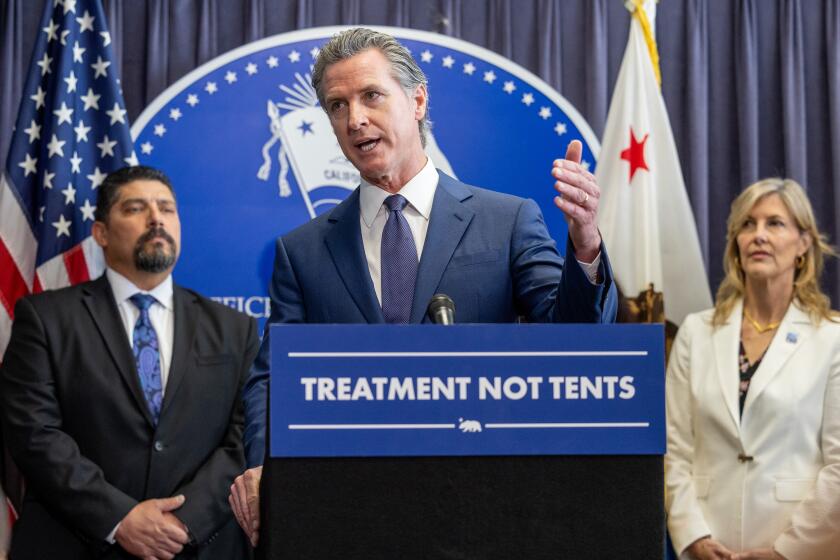Obamacare repeal bills could put coverage out of reach for millions of sick Americans
President Trump and congressional Republicans, despite repeated pledges to preserve sick Americans’ access to health coverage, are poised to scrap this core insurance protection in their campaign to roll back the Affordable Care Act.
Both the House GOP bill that passed in May and the revised Senate GOP bill unveiled last week effectively eliminate the coverage guarantee by allowing health insurers to once again sell skimpier plans and charge more to people with preexisting health conditions who need more-comprehensive coverage.
At the same time, the House and Senate bills dramatically scale back financial aid to low- and moderate-income consumers, and slash funding for Medicaid, the government safety-net plan that has helped millions of sick and poor Americans gain coverage.
That combination — looser insurance requirements and less financial assistance for patients — will once again put health plans out of reach for millions of sick Americans, according to numerous analyses.
“The fundamental guarantee at the heart of the Affordable Care Act was that people who are sick can get insurance at the same price as everyone else,” said Larry Levitt, an insurance market expert at the nonprofit Kaiser Family Foundation. “The House and Senate replacement bills move the system back to a place where healthy and sick people are treated very differently.”
The Senate bill was enveloped by more uncertainty Saturday night when Majority Leader Mitch McConnell (R-Ky.) announced he was delaying action on the measure because fellow Republican Sen. John McCain of Arizona was recovering from surgery for a blood clot.
Republicans have a 52-48 majority in the Senate, and McConnell can afford to lose only two Republicans if the bill is to advance. The Senate had been scheduled to begin voting on its healthcare bill this week, and GOP Sens. Rand Paul of Kentucky and Susan Collins of Maine have already said they will oppose it.
Obamacare’s coverage guarantee remains among the most popular parts of the 2010 law, with nearly 7 in 10 Americans rating it favorably.
Trump administration officials and congressional leaders insist the Republican bills won’t leave anyone behind.
“The legislation ensures that every American with preexisting conditions has access to the coverage and care they need, no exceptions,” Vice President Mike Pence told a meeting of the National Governors Assn. in Rhode Island on Friday.
We think it’s great to give people more options and more choices and the freedom to actually buy the insurance products they want.
— Sen. John Thune, R-S.D.
But that assurance has been contradicted by nearly every independent evaluation of the Republican healthcare bills, including two lengthy reports by the nonpartisan Congressional Budget Office.
Pence’s claims are also at odds of with the assessment of health insurers themselves.
On Friday, the heads of the industry’s two leading advocacy groups — America’s Health Insurance Plans and the Blue Cross Blue Shield Assn. — called the Senate bill “simply unworkable,” warning it “would undermine protections for those with preexisting medical conditions.”
Similarly, in a letter to Senate leaders this month, the American Academy of Actuaries warned that provisions of the Senate GOP bill “could erode preexisting condition protections” and “make it more difficult for high-cost individuals and groups to obtain coverage.”
Nearly every major patient advocacy organization has reached the same conclusion.
“Older and sicker individuals … would face the full cost of these higher premiums, leaving millions of people with chronic conditions and disabilities unable to afford the kind of coverage they need,” a coalition of 13 patient groups wrote in a letter to senators last week, condemning the latest version of the Senate bill.
The coalition includes the American Heart Assn., the American Lung Assn., the March of Dimes, the Cystic Fibrosis Foundation, the AARP and the advocacy arm of the American Cancer Society.
The kind of deregulated insurance markets envisioned by the House and Senate bills would mark a return to what health insurance looked like before the current healthcare law was enacted in 2010.
Before Obamacare, most insurance companies worked aggressively to exclude sick customers, either denying coverage altogether or charging unaffordable prices to people with preexisting conditions such as cancer, diabetes, even acne.
That left tens of millions of Americans with next to no options for coverage.
Although some states offered special health plans for sick patients who’d been rejected by insurers, most of these so-called high-risk pools limited benefits or capped enrollment because the coverage was so costly.
“It was a medical gulag,” said Richard Figueroa, former enrollment director of California’s plan, which had a long waiting list because demand always outstripped money available for coverage.
Obamacare fundamentally equalized how health insurance treats patients. Insurers were not only forbidden to deny coverage to sick consumers, they had to provide a basic set of benefits.
That standardization ensured that sick Americans were not forced to pay more for health insurance than healthy Americans, who might be tempted to buy skimpier plans that did not offer some benefits, such as prescription drugs or mental health and substance-abuse therapy.
This meant higher costs for some consumers, particularly those who enjoyed lower premiums before the law, when insurers were allowed to exclude the sick.
But uniform standards are necessary to ensure equal access to coverage, said Manatt Health managing director Joel Ario, a former insurance commissioner in Oregon and Pennsylvania. “It doesn’t work unless everyone participates on the same terms.”
To date, more than 20 million Americans have gained coverage through the law and many more depend on its protections.
Republicans have been careful to emphasize that their Obamacare repeal legislation does not repeal the coverage guarantee that prohibits insurers from denying coverage.
Sen. Bill Cassidy (R-La.) famously pledged that he wouldn’t vote for a bill that didn’t pass what he called the “Jimmy Kimmel test,” in a reference to the late-night host’s emotional explanation of how important it had been that his baby son was not shut out of insurance coverage after being born with congenital heart disease.
Last week, Senate GOP leaders said they were simply trying to give consumers the opportunity to find more-affordable coverage.
“We think it’s great to give people more options and more choices and the freedom to actually buy the insurance products they want,” said Sen. John Thune of South Dakota, the third-ranking Republican.
Conservative Republicans led by Texas Sen. Ted Cruz, who insists on the insurance deregulation, have said they will not support the Obamacare repeal bill without Cruz’s amendment.
But offering this kind of “choice” — even with additional money to help sick consumers — would effectively end the coverage guarantee, the two health insurance groups said.
“Given our experience and long-standing commitment to providing health care coverage, we understand what it takes to make health insurance markets work for consumers,” the presidents of the groups wrote.
“We believe strongly that the rules must apply equally to all insurance.”
Times staff writer Lisa Mascaro contributed to this report.
ALSO
McConnell defers action on healthcare vote after McCain surgery
Lazarus: Revised GOP healthcare bill succeeds at making things even worse
Hiltzik: Here are the hidden horrors in the Senate GOP’s new Obamacare repeal bill
More to Read
Get the L.A. Times Politics newsletter
Deeply reported insights into legislation, politics and policy from Sacramento, Washington and beyond. In your inbox three times per week.
You may occasionally receive promotional content from the Los Angeles Times.







